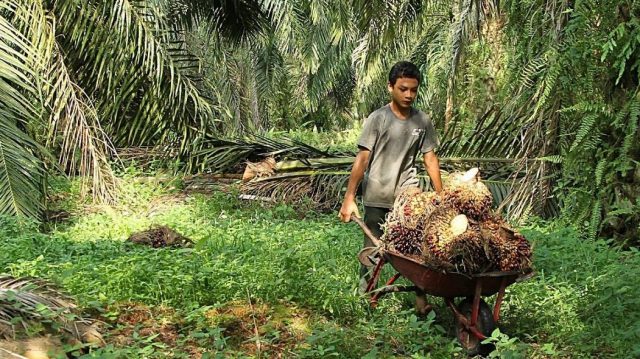Last October, Putri and Surna went to the fireworks factory they worked at every day in Tangerang on the outskirts of Jakarta. But this was not an ordinary day: a spark came into contact with gunpowder stored at the factory, triggering an explosion that killed 47 workers, including Putri and Surna.
The two were just 14 and 15, and their work as child laborers at the factory was illegal.
Three years ago the Indonesian government created a roadmap to end child labor in the country by 2022, but with less than four years to go it appears that this is a far-off reality. According to UNICEF, an estimated 2.7 million children are involved in child labor in Indonesia — and half of them are under 13.
From palm oil plantations, tobacco farms, and factory work, the Equal Times explains that dangerous child labor is widespread:
According to the latest report of the United States Department of Labor, although Indonesia made a “moderate advancement” in the efforts to eliminate the worst forms of child labour in 2016, with the formation, for example, of local anti-trafficking task forces in the various provinces, or community-based monitoring inspectors to report incidences of child labour, minors are still performing hazardous tasks on oil palm and tobacco plantations, and are also present in the sex industry.
Under Indonesian law, the minimum working age is 15, although light work can be done as of age 13, as long as it does not stunt or disrupt the child’s physical, mental or social development and is limited to no more than three hours a day. The minimum working age, however, rises to 18 for occupations considered to be hazardous, such as the fireworks factory where Putri and Surna worked.
“The factory owner claims he did not know they were under age, but he is legally obliged to check,” says Andre Yakob Silitonga, one of the lawyers working on the case.
In the palm oil industry, child labor in common because male laborers have unattainably high company quotas for palm fruit harvesting, prompting them to bring their wives and children to the plantations. Even certified Roundtable on Sustainable Palm Oil (RSPO) plantations are guilty of this practice.
Freedom United’s partner, Rainforest Action Network, has “documented cases where the plantations are given the heads up that the auditors will be coming [and so they are taken to very specific areas of the plantations],” according to Emma Lierley, forests communications manager for RAN.
Human Rights Watch has also investigated hazardous child labor in Indonesia’s tobacco industry, finding that kids were exposed to acute nicotine poisoning and toxic pesticides.
Although Indonesia has laws on child labor, they are not aligned with international standards and corruption means officials turn a blind eye.
Human Rights Watch says ultimately “Inadequate regulations and poor enforcement of the law, particularly in the small-scale farming sector, leave children at risk.”







Freedom United is interested in hearing from our community and welcomes relevant, informed comments, advice, and insights that advance the conversation around our campaigns and advocacy. We value inclusivity and respect within our community. To be approved, your comments should be civil.